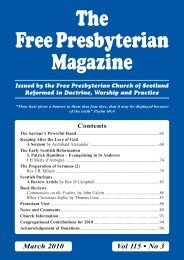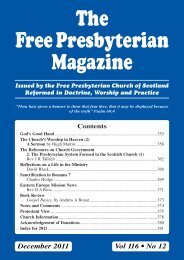May - the Free Presbyterian church of Scotland
May - the Free Presbyterian church of Scotland
May - the Free Presbyterian church of Scotland
Create successful ePaper yourself
Turn your PDF publications into a flip-book with our unique Google optimized e-Paper software.
Scottish Reformers’ View <strong>of</strong> Romanism 145<br />
Alesius, on <strong>the</strong> o<strong>the</strong>r hand, was converted through <strong>the</strong> instrumentality <strong>of</strong><br />
Patrick Hamilton, shortly before <strong>the</strong> latter’s martyrdom, when Alesius tried<br />
to reason him out <strong>of</strong> his “heresy”. Alesius shows less wisdom than Macdowell.<br />
He too fled to <strong>the</strong> Continent about 1531, and in 1540 (perhaps reluctantly)<br />
he participated in a conference at Worms seeking to reconcile Romanists and<br />
Lu<strong>the</strong>rans. It was even proposed that he might attend <strong>the</strong> Council <strong>of</strong> Trent<br />
for that purpose. He seems to have been more <strong>of</strong> <strong>the</strong> spirit <strong>of</strong> Melancthon,<br />
and was slow to realise <strong>the</strong> impossibility <strong>of</strong> reforming <strong>the</strong> Church <strong>of</strong> Rome.<br />
The fact that <strong>the</strong> Roman Church is beyond reformation is closely connected<br />
with <strong>the</strong> doctrine that <strong>the</strong> Papacy is <strong>the</strong> Antichrist.<br />
Ano<strong>the</strong>r early Scottish Reformer whose doctrinal views are recorded is<br />
John Borthwick (died in 1569), a soldier and a member <strong>of</strong> <strong>the</strong> nobility, who<br />
fled to England in 1540. He was condemned in his absence on 13 charges: he<br />
rejected indulgences; he believed that priests might marry; he believed that<br />
<strong>the</strong> “heresies” <strong>of</strong> England and <strong>the</strong> new liturgy were commendable; that <strong>the</strong><br />
orders <strong>of</strong> friars and monks should be abolished as <strong>the</strong>y had been in England;<br />
and that <strong>the</strong> Pope was guilty <strong>of</strong> simony in selling spiritual things; he read <strong>the</strong><br />
New Testament in English and heretical books by Melancthon, Erasmus and<br />
o<strong>the</strong>rs, and passed <strong>the</strong>se on to o<strong>the</strong>r people; and, above all, he refused to<br />
acknowledge <strong>the</strong> authority <strong>of</strong> <strong>the</strong> Roman See or be subject to it.<br />
Before moving on to George Wishart, we should notice <strong>the</strong> six months <strong>of</strong><br />
Protestantism in 1543 while <strong>the</strong> Earl <strong>of</strong> Arran was Governor. In particular,<br />
an Act was forced through Parliament, against <strong>the</strong> will <strong>of</strong> <strong>the</strong> Bishops, giving<br />
permission for <strong>the</strong> reading <strong>of</strong> <strong>the</strong> Bible in English. Up to this point, <strong>the</strong>re had<br />
been private meetings <strong>of</strong> Protestants, and also public preaching. This was<br />
especially so for <strong>the</strong> six months under Arran, but <strong>the</strong>re was no permanent,<br />
separate Protestant Church in <strong>Scotland</strong>.<br />
(3.) George Wishart. George Wishart (1513-1546), from near Montrose,<br />
studied at <strong>the</strong> University <strong>of</strong> Louvain (which sent a congratulatory letter to<br />
Archbishop Beaton for <strong>the</strong> burning <strong>of</strong> Hamilton) in 1532, and <strong>the</strong>n taught<br />
New Testament Greek in Montrose. He had to flee <strong>the</strong> country in 1538. He<br />
returned to <strong>Scotland</strong> in 1543 during <strong>the</strong> “blink” <strong>of</strong> Protestantism.<br />
He had a “Calvinistic” background ra<strong>the</strong>r than a Lu<strong>the</strong>ran one, and an<br />
indication <strong>of</strong> his <strong>the</strong>ological position is given by his translation <strong>of</strong> <strong>the</strong> First<br />
Helvetic Confession <strong>of</strong> 1536 into English. This was compiled by Henry<br />
Bullinger and o<strong>the</strong>rs and is a brief but standard Protestant Confession.<br />
Wishart’s translation was published in London in 1548, after his death,<br />
and was in fact <strong>the</strong> first published edition <strong>of</strong> <strong>the</strong> Confession. It is mainly<br />
positive, affirming points ra<strong>the</strong>r than rejecting <strong>the</strong>m. In affirming that Christ<br />
is <strong>the</strong> Head <strong>of</strong> <strong>the</strong> Church, however, it does explicitly reject <strong>the</strong> authority <strong>of</strong>

















